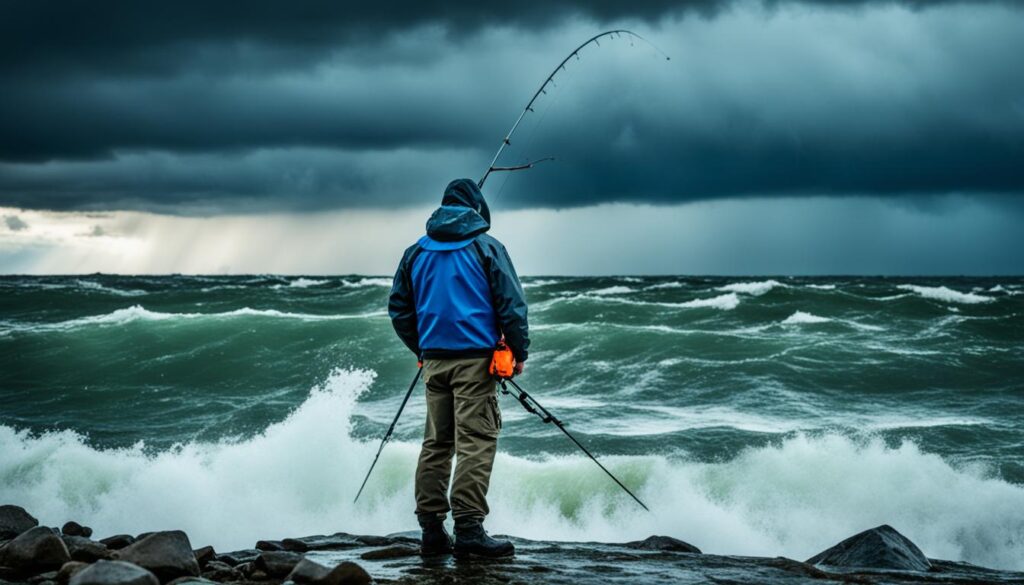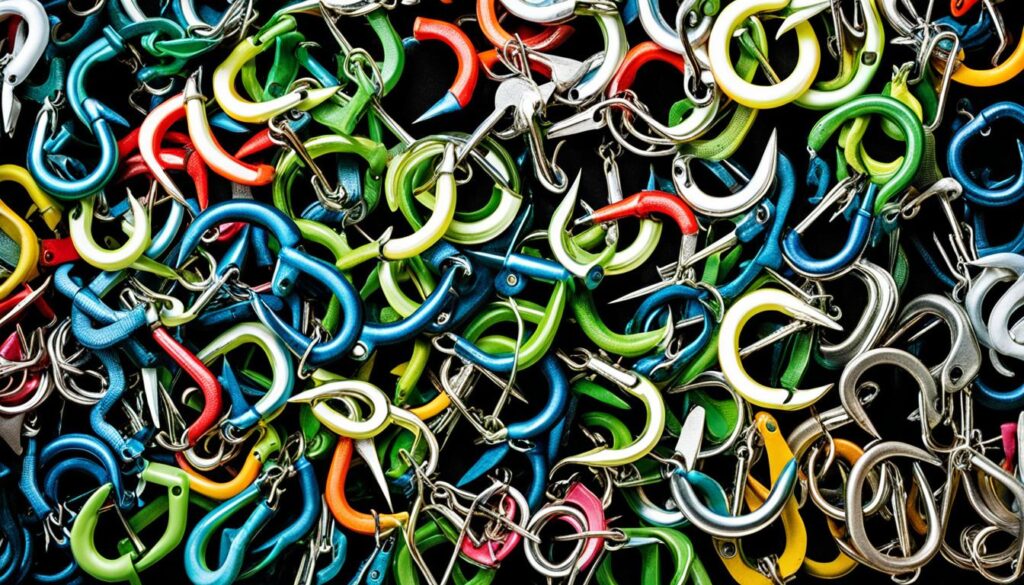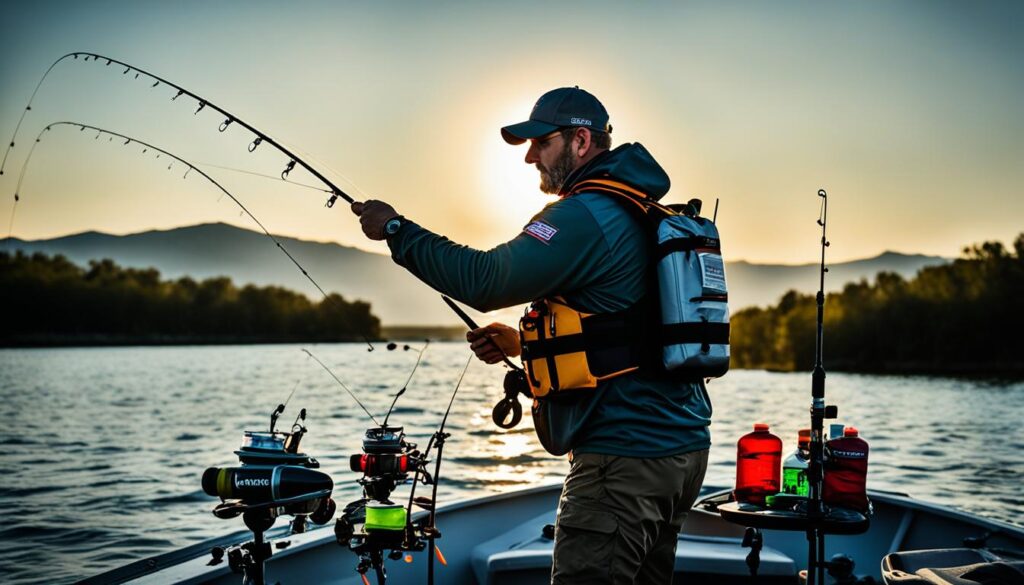Bass Fishing is a fun and thrilling hobby, but safety always comes first. Whether you’re just starting out or you’re an old pro, knowing how to stay safe is key. We’re here to share the most essential safety tips for fishing trips.
Angler’s Essentials:
- Follow safe fishing practices to prevent accidents or injury.
- Wear a life jacket when fishing from a boat or in deep water.
- File a float plan before going on a fishing trip.
- Stay prepared and be aware of weather conditions.
- Handle hooks and tools with caution to avoid injuries.
Wear a Life Jacket
One of the top safety tips in fishing is remembering your life jacket. It’s critical for being safe on a boat or near deep water. By wearing it, you stay smart, meet life jacket regulations, and show you care about water safety for anglers. Always make sure everyone with you has a life jacket that fits well.
It’s also crucial to look after your fishing gear’s safety. While on the water, you should stick to fishing gear safety guidelines to avoid accidents. This means keeping your gear protected and avoiding any mess or tangles.
Fishing Safety Quote:
“Wearing a life jacket is a simple yet crucial step in ensuring water safety for all anglers. It’s better to be safe than sorry!” – [Fishing Expert]
Keep in mind the water safety guidelines are there to keep everyone safe. By wearing your life jacket and handling your gear safely, you can enjoy peace of mind. This means you’re playing your part in staying safe on the water.
File a Float Plan
Before you head out fishing, make sure you file a float plan. This keeps you safe and helps others know where you are. Tell people like family or friends where you’re going, when you plan to return, and who to call in an emergency.
Using a fishing trip safety checklist is brilliant, too. It helps you remember crucial safety tips before you start. Check your fishing gear, have safety gear, and see if your boat is in top shape. This way, you cover all bases to stay safe.
Knowing what to do in an emergency is critical on a fishing trip. It could be the key to saving someone’s life. Learn first aid, CPR, and the best communication methods during an emergency. This knowledge prepares you for quick and effective action in crisis times.
Always be ready for the unexpected, even on a simple fishing expedition. You boost your trip’s safety by using a float plan, a safety checklist, and knowing emergency procedures. These simple steps could make a big difference in having a great fishing experience.
| Fishing Trip Safety Measures |
|---|
| File a float plan |
| Complete a fishing trip safety checklist |
| Be familiar with emergency procedures |
Be Prepared and Be Weather Aware

Fishing safety is all about being ready and watching the weather. Take steps and check the weather to ensure your fishing time is not only fun but safe.
Always remember these key tips:
Gather Essential Safety Items
Before you leave for your fishing trip, gather some important safety gear. This includes:
- A first aid kit with everything to handle small injuries and accidents.
- Good bug spray to keep insects away.
- Medicines you might need while fishing.
Check the Weather Forecast
It’s vital to look at the weather forecast before you go. Weather can shift quickly, and knowing about possible storms or bad weather can keep you out of harm’s way.
If the forecast looks bad, waiting for better weather is smarter. Safety comes first, always.
Follow Safe Fishing Techniques and Guidelines
Sticking to safe fishing rules helps you stay out of danger. Here’s what to remember:
- Never forget your life jacket, especially in deep or open water.
- Watch out for slippery areas, like on rocks or docks.
- Don’t cast your line near other people to avoid hook accidents.
- Use fishing tools and gear with caution to avoid getting hurt.
By keeping these fishing safety tips in mind, you’ll lower the chance of accidents and have a great time fishing.
Handle Hooks and Tools with Caution

Fishing can be fun, but staying safe is the most important thing. Be careful with hooks, tools, and fishing gear to avoid getting hurt. Use fish hook safety tips and carefully handle everything to make fishing more enjoyable.
Be Mindful of Fish Hook Safety
Fish hooks are sharp and can hurt you if not careful. Never put them close to your face or body. When taking a hook out of a fish, stay safe the right way.
Keep your hands away from the sharp part of the hook. Hold the hook by the part without the barb or use pliers. Following these steps cuts the chance of getting hurt by a hook.
Practice Safe Handling of Fishing Equipment
It’s also key to handle all fishing gear safely. Hold rods, reels, and tools tightly and avoid sudden moves. Always read the manual on how to use equipment safely.
When moving fishing gear around, ensure it’s not dangerous to you or anyone else. Don’t swing rods, and keep tackle boxes closed. This keeps you safe from sharp hooks or other dangers.
Take Precautions in Fish Handling
Handling fish safely is good for them and you. Some fish have sharp parts that can cut you. Wear gloves when dealing with these fish to stay safe.
If you’re handling a toothy fish, like a pike, use a unique tool or long pliers. This keeps you from getting bitten.
Regular Maintenance of Fishing Equipment
It is important to keep your fishing gear in good shape. Check rods, reels, and other gear for damage. If you find something, fix or replace it to keep it safe.
Keep reels clean and lubricated to work well. After fishing, rinse gear with fresh water to avoid damage from salt. This helps your equipment last longer.
| Fish Hook Safety Tips | Safe Handling of Fishing Equipment | Fish Handling Precautions | Fishing Equipment Maintenance |
|---|---|---|---|
| Be mindful of hook points and barbs | Hold equipment securely and avoid sudden movements | Wear protective gloves when handling fish | Regularly inspect and replace damaged equipment |
| Use proper hook removal techniques | Securely transport rods and tackle boxes | Use fish dehooking tools for fish with teeth | Clean and lubricate reels regularly |
| Keep hooks away from face and body | Follow manufacturer’s instructions for handling | Rinse fishing equipment with freshwater after use |
Stay Hydrated and Protect Yourself from the Sun
Staying hydrated and safe in the sun is key for a great fishing day. Your health needs to care for yourself when out in the sun for a long time. Use these tips for sun protection and water safety during fishing:
1. Bring plenty of water
Dehydration can harm you, especially during activities like fishing. Bring lots of water and keep drinking. Aim for at least a liter per person per hour to avoid getting dehydrated.
2. Wear appropriate sun protection
To protect your skin from the sun, use a high SPF, ideally waterproof, sunscreen. Please put it on liberally all over, including your ears and feet. A wide-brimmed hat and clothing that blocks the sun’s rays are also smart choices.
3. Follow water safety practices
Water safety is a must for anglers, especially if they’re fishing in deep waters. Always wear a life jacket when fishing from boats. Also, remember to avoid alcohol, stay clear of strong currents, and be careful on slippery surfaces. These steps keep you safe while fishing.
“Staying hydrated and protecting yourself from the sun are essential for a safe and enjoyable fishing experience.”
Fishing can be fun and safe if you drink enough water and use the right sun protection. Remember to keep hydrated, use sunscreen, and follow safety rules. This way, you can have a great time fishing without worrying about sunburn or dehydration.
Know the Regulations and Be Conscious of the Environment
Fishing safety starts with knowing the rules. Learn the rules in your area for a safe and fun time. This includes what fishing methods are allowed and the seasons for fishing. This knowledge helps keep you safe while you enjoy fishing.
Following these rules lowers the chance of getting hurt. They give advice and tips to prevent accidents. Knowing and sticking to the rules is good for everyone’s safety.
Remember, following safety guidelines is good for you and the environment. Be aware of how fishing impacts nature. Fishing responsibly helps keep our environment healthy.
It’s important to fish in ways that protect our environment. Do catch and release, throw away trash right, and don’t fish in harmful ways. This helps keep our waters full of fish for the future.
Benefits of Knowing the Fishing Regulations and Being Environmentally Conscious
Understanding fishing rules has many advantages:
- Less chance of accidents
- Helps fish and the places they live
- Maintains habitats
- Keeps natural resources safe
- Encourages fishing that lasts
By knowing the rules and caring about nature, you help the sport and the environment. And it makes fishing fun and safe for all.
Stay Informed and Make a Difference
Keep up with news and updates about safety and nature. Listen to fishing expert groups. This information and the environment can help you make smart choices and protect water life.
Now you see the importance of following rules and caring about nature. Let’s explore how to safely handle fishing gear and avoid accidents.
Conclusion
Safety comes first when fishing in the great outdoors. You can follow essential fishing safety tips to stay safe. This helps reduce the chance of accidents and harm.
I’d like you to know the fishing safety rules. Always wear a life jacket and tell someone where you’re going. Keeping an eye on the weather is also very important.
Use fishing gear carefully and watch out for the sun. Drink plenty of water to stay healthy. And always respect nature by fishing in a sustainable way.
With these tips, you’re ready to fish safely. Prepare your equipment, follow the rules, and enjoy fishing without worries!
FAQ
What is the importance of fishing safety?
Fishing safety helps you avoid accidents or getting hurt on your trips. By being careful and following rules, you make your fishing fun and safe.
When should I wear a life jacket while fishing?
Always put on a life jacket when you go fishing, especially on boats or in deep water. Make sure it fits right and you’re following the law.
What should be included in a float plan?
Your float plan must have where you’re going, when you’ll be back, and who to call if they need to. It’s smart to let others know your plans before you go out.
How can I be prepared for fishing emergencies?
Have a first aid kit, bug spray, and your meds ready. Watch the weather and don’t fish when it’s bad. Know what to do in an emergency.
What precautions should I take when handling hooks and fishing equipment?
Be careful with hooks and tools to prevent accidents. Learn how to remove hooks safely. Keep your gear in good shape for safety.
How can I protect myself from the sun while fishing?
Drink water and shield yourself from the sun. Wear sunscreen, a hat, and protective clothing. Play it safe near water too.
What should I know about fishing regulations and environmental preservation?
Know the fishing rules where you fish and stick to them. Fish responsibly to keep the environment healthy. Safety and following the law are key.
